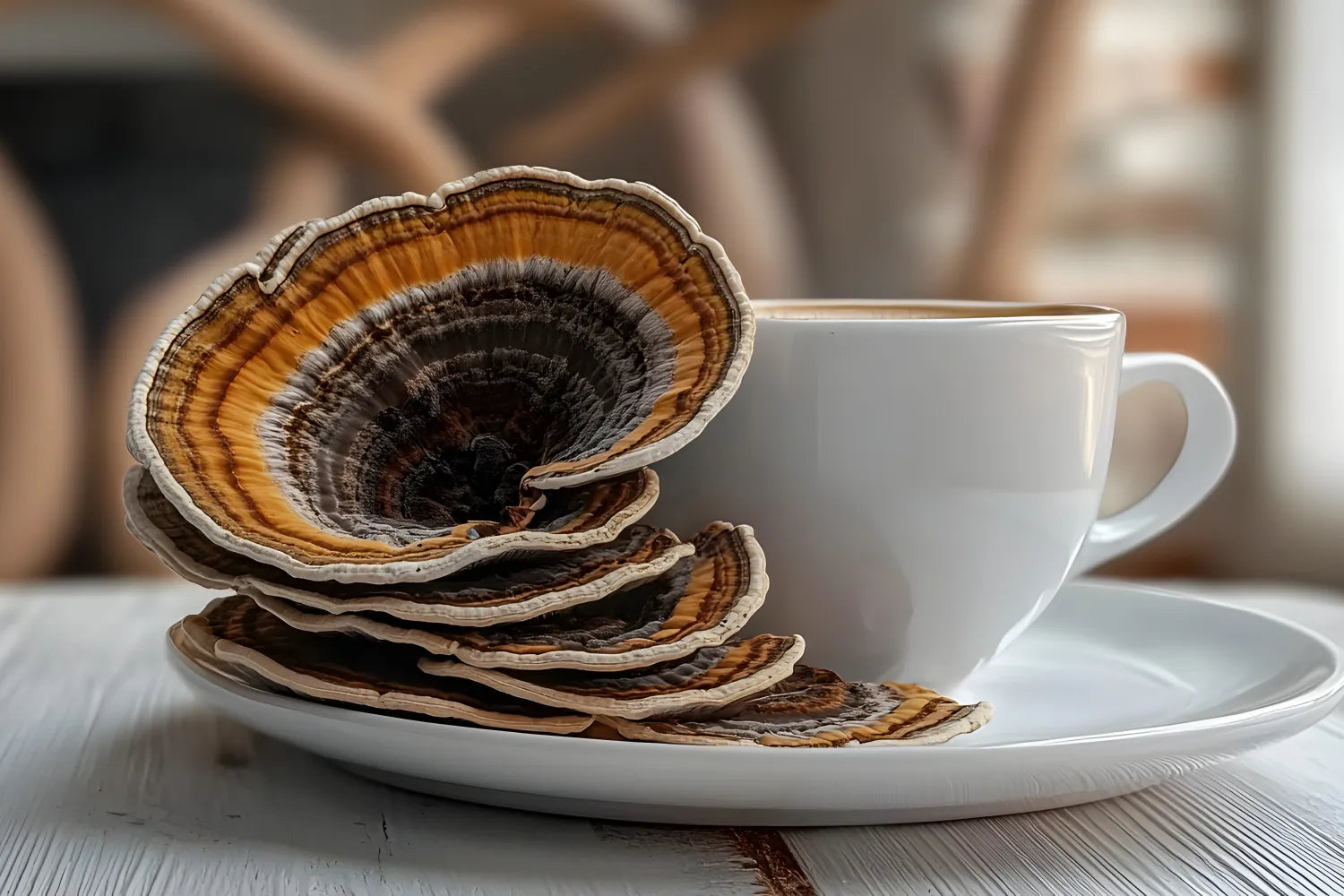Chaga vs. Turkey Tail: Benefits and Which Is Best for You

These days, it seems like there’s a supplement for everything. To be more accurate, there are many supplements for everything. So many herbs and vitamins provide similar support, and you may be wondering how you’re supposed to choose the one that suits you best.
For instance, chaga and turkey tail are two functional mushrooms that are both known for their abilities to support the immune system — but which is truly the best? Read on to learn more about each mushroom, which is best, and how to take them both.
What Is Chaga Mushroom?
Chaga mushrooms (Inonotus obliquus) grow in cold climates throughout North America, Europe, and some parts of Asia. Although they’re relatively common, you might not immediately notice a chaga mushroom out in the wild.
The reason for this is that chaga mushrooms don’t look like traditional mushrooms — they don’t have stalks and caps, and they don’t grow out of the ground. Instead, they look like black, lumpy growths that grow on birch trees. This dark color is why chaga mushrooms are often harvested in the winter when it’s easier to see them.
What Are the Benefits of Chaga?
Chaga might be new to many people, but it’s been around for hundreds of years. It’s even a staple in a few different forms of Eastern medicine, such as Traditional Chinese Medicine (TCM).
Today, we know the benefits of chaga are due to some of the beneficial compounds it contains, such as melanin, triterpenoids, and sterols.
The benefits of chaga mushrooms include:
- Supports a Healthy Blood Sugar: Early research suggests that chaga may support healthy blood glucose levels, although more research is needed to confirm this.
- Encourages Healthy-Looking Hair and Skin: Melanin can support strong hair, while certain compounds in chaga can encourage vibrant and healthy-looking skin. Chaga can also encourage hair growth.
- Provides Antioxidant Support: Many mushrooms and plant compounds contain antioxidants, but chaga contains particularly powerful antioxidants that can support long-term health.
- Encourages Immune System Health: Chaga mushrooms may support the body’s production of white blood cells, which provide day-to-day immunity.
What Is Turkey Tail Mushroom?
Turkey tail mushrooms (also known as Trametes versicolor) grow on fallen trees and branches throughout North America, Europe, and Asia. They can be found throughout the year and tend to have rings of white, brown, orange, and gray, similar to actual turkey tail feathers.
Turkey tail mushrooms usually grow in clusters that fan outwards, with many fruiting bodies growing on top of each other. Turkey tail mushrooms look remarkably like false turkey tail mushrooms (as the name suggests), but you can tell them apart by their white undersides and visible pores.
What Are the Benefits of Turkey Tail?
Just like chaga, turkey tail mushrooms have been used for hundreds of years in TCM and even Native American herbalism. It’s one of the most well-known mushrooms because it is completely edible, but you might not have heard much about its specific benefits.
The benefits of turkey tail mushrooms include:
- Supports Brain Health: Turkey tail contains ergothioneine, a compound that has been shown to support brain health.
- Encourages Immune Health: Turkey tail contains certain polysaccharides that can modulate the immune system and reduce inflammation.
- Provides Antioxidants: Like many other mushrooms, turkey tail contains antioxidants, which can fight off free radical damage and support overall health.
- Encourages Gut Health: Like many mushrooms (including chaga), turkey tail contains prebiotic fibers that can support the gut microbiome.
- Supports Heart Health: Finally, turkey tail contains proteins that can support healthy cholesterol, heart rhythms, and blood pressure.
Which Is Best — Chaga or Turkey Tail?
Now, let’s get back to the question that started this discussion: Which one is the best? Obviously, it’s hard for us to say which is best for you because your health situation is unique. That said, here are some things to consider as you decide which one to opt for.
- Desired Benefits: Both mushrooms can support the immune system, but chaga stands out for its superior antioxidant properties and ability to support skin and hair health. Meanwhile, turkey tail can support heart and brain health.
- Availability: Consider what types of supplements are available to you and how accessible they are.
- Health Background: If you’re pregnant, breastfeeding, taking medications, or have preexisting health conditions, talk to a doctor before starting any mushroom supplement. Also, you should check with a doctor before taking chaga if you have a history of kidney problems.
When you’re trying to pick a supplement, make sure you consider quality. Were the mushrooms grown on wood or grain? Which parts of the mushroom were used — mycelium or fruiting bodies? Beyond that, were the mushrooms properly extracted?
At Everyday Dose, we think taking a supplement should be as easy as possible. That’s why we designed a supplement that’s as simple as drinking a cup of coffee.
Our Mushroom Coffee+ contains chaga and lion’s mane mushrooms, L-theanine, collagen protein, and coffee extract to support quick thinking, focus, and overall gut health. All you need to do is add water and enjoy!
Final Thoughts
Chaga and turkey tail are both popular functional mushrooms, and ultimately, the choice comes down to preference and availability. While both can support the immune system, turkey tail has also been shown to support heart and brain health, while chaga can encourage hair and skin health.
At Everyday Dose, we make mushroom coffee — mushrooms are kind of our thing. After looking at all of the options, we chose to include chaga and lion’s mane in our specialized nootropic blends. To learn more about our ingredients and what they do, visit the Everyday Dose blog today.
Sources:
Immunomodulatory Activity of the Water Extract from Medicinal Mushroom Inonotus obliquus | PMC








